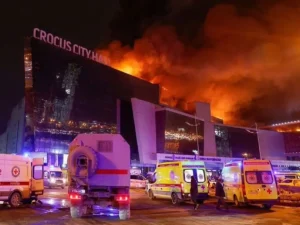As the death toll may rise beyond 140, Moscow reels from a devastating terrorist attack, with ensuing confusion over missing individuals and emerging political blame games.

The tragedy, which unfolded in the bustling Crocus City Hall, saw attendees fall victim to smoke and flames as much as to the violence itself, complicating identification efforts and deepening the tragedy’s impact. As the city grapples with loss, a contentious narrative unfolds at the government level, with Russian officials suggesting a conspiracy involving Ukraine and Western nations, despite indications pointing toward an IS-affiliated group’s responsibility.
This narrative has spurred a mix of skepticism and indignation internationally, with Western leaders and Ukrainian officials categorically denying involvement, criticizing Moscow’s accusations as baseless. The situation is further muddled by conflicting accounts regarding the attackers’ movements post-incident, adding layers of intrigue and complexity to an already fraught scenario.
As Moscow mourns, the world watches, waiting for clarity and truth to emerge from a situation fraught with grief, confusion, and geopolitical tension. The city’s heartache is mirrored in the global arena, where the quest for answers and accountability continues amidst a cacophony of competing narratives and deepening distrust.
(Associated Medias) – Tutti i diritti sono riservati
